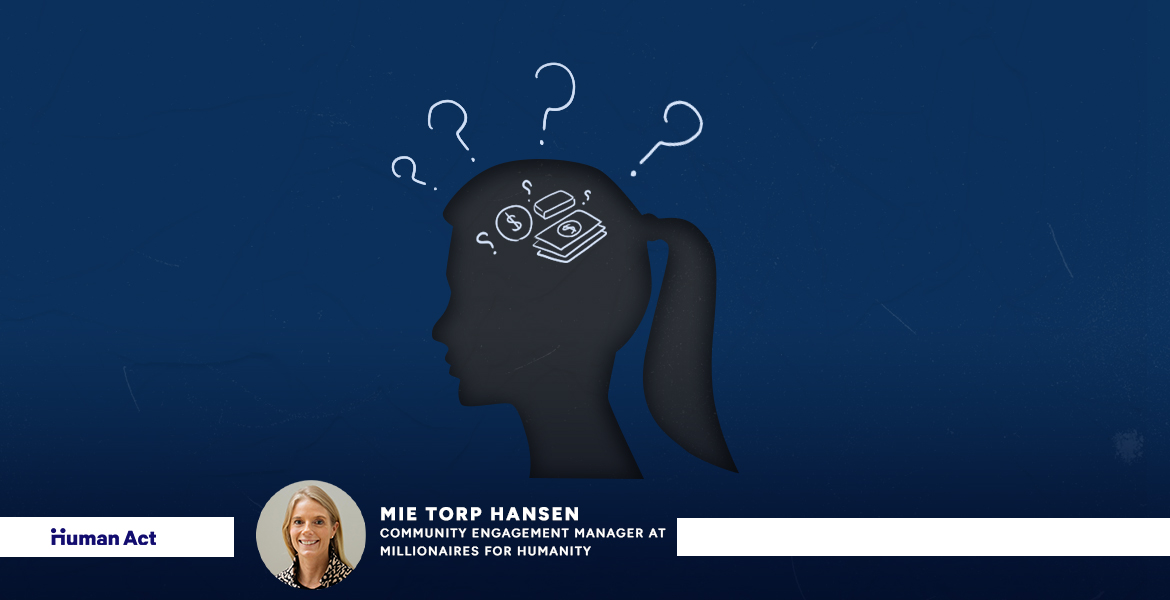


A look inside the search for the ultra-wealthy who believe in a fairer world.
By Mie Torp Hansen Community Engagement Manager at Millionaires for Humanity
First things first. My name is Mie Torp Hansen. I have a master’s degree in Economics and used to be a management consultant at PwC. For the past 7 years, however, I’ve been fulfilling a lifelong dream of sailing around the world. Since February 2021, I’ve taken on a new challenge as the Community Engagement Manager for Millionaires for Humanity. My job is to find and engage millionaires who support a wealth tax.
And it’s not easy.
I normally say my job is like finding a needle in a haystack. 🧐 Millionaires, and even more so billionaires, are extremely busy people. They’re often maintaining huge networks and juggling several projects at once (which is probably one of the reasons they got rich in the first place). The chances of them even seeing my email are slim.
Even when I manage to get a proposal past a personal assistant, the likelihood they will have time to respond is very low. But the challenge doesn’t stop there.
When I do manage to connect, a common response is: “I don’t support a wealth tax because I don’t trust our government to spend the money wisely.”
I understand where they’re coming from. They’ve seen failed attempts by governments to handle climate change and inequality in a meaningful way. But so have the rest of us. It makes me think about the privilege embedded in that statement.
Imagine if the rest of us—the 99% of income-tax-paying-souls who, by the way, pay a much higher share of our total wealth in taxes than any rich person does—decided we would no longer pay taxes because we ‘don’t trust our governments’. Our societies would collapse immediately. That would benefit no one, and probably the millionaires and billionaires the least.
Another response I often get is: “I support your initiative, but I am not ready to speak up for a wealth tax,” or “I am too busy to get involved.”
To be a millionaire and publicly advocate for a wealth tax is a genuinely difficult task. Many of our members no longer speak to parts of their family who disagree with their advocacy. This is despite the fact that a wealth tax of 1-5% would do nothing to harm the family’s financial well-being. It wouldn’t even be enough to significantly change our current wealth hierarchies.
Furthermore, the public doesn’t always treat these millionaires as the heroes I believe they are. I see nasty comments on social media, and I even know of one millionaire who had his house broken into. Nothing was stolen, but the knives in his kitchen were rearranged—a clear message that his advocacy was not appreciated.

It’s a lot easier to give money to charity. Jeff Bezos gets treated like a rock star when he gives a few million dollars to food banks. No one asks why we have food banks in the first place, and everyone fails to see that a few million dollars for Jeff Bezos is like pocket change for the rest of us.
Philanthropy has another benefit (for the giver): the millionaire has 100% control of where the money goes. It even provides a nice tax cut, which can then be used to make even more money on the financial market.
Unfortunately, charity cannot save our world. The last 50 years have shown this clearly, as the rich have obtained a larger and larger share of global wealth while the less fortunate struggle to survive. We need wealth taxes to ensure everyone is paying their fair share. Philanthropy should be in addition to taxes, not a substitute for them.
I’m not against millionaires. And I don’t think inequality is wrong per se. People who go the extra mile to build companies and create jobs should be rewarded. But the level of wealth inequality the world is seeing today is not healthy.
According to Oxfam International, the world’s richest 1% have more than twice as much wealth as 6.9 billion people. On average, only 4 cents in every dollar of tax revenue comes from taxes on wealth. With great wealth comes great power, and this concentration of resources in the hands of a few undermines our democracies. We are funneling wealth to an elite at the expense of the poorest in society.
Ending extreme poverty is a policy choice. It’s not because we don’t have the resources. It’s because we have accepted a system that allows the rich to get richer at the expense of hardworking people.
I’ve asked myself many times: If I were a millionaire, would I be publicly advocating for a wealth tax?
I’m not sure I would. I might not even be aware of the level of inequality in the world, as I wouldn’t be exposed to it. My friends would likely be rich, and my contact with the “99%” would be with people providing a service to me, who would have no incentive to tell me about life outside my bubble.
If I were a millionaire, I might go for the easy solution: pay as little tax as legally possible, do some meaningful philanthropy, and otherwise live a quiet life.
I hope I wouldn’t. I hope I would be brave enough to advocate for a wealth tax.
That’s why we should have the deepest admiration for the millionaires who are out there fighting for a more fair tax system. They are pioneers, using their privilege to challenge a system that benefits them. In the fight to solve our world’s greatest challenges—poverty, inequality, and climate change—they are standing on the right side of history, helping to build a world where no one is left behind. 🌍✊